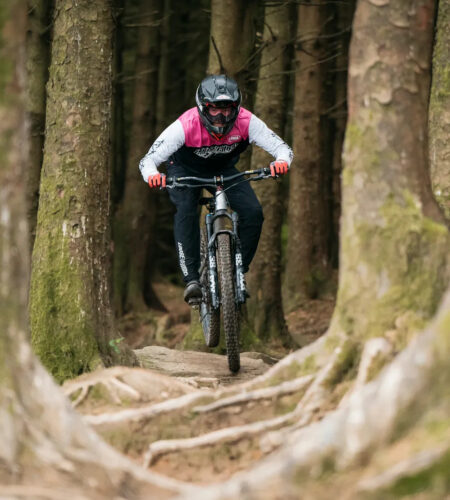In the lush landscapes of Wales, an innovative partnership is taking root, blending adrenaline-fueled adventure with environmental stewardship. Bike Park Wales, a renowned mountain biking destination, is pioneering a unique model by funding rewilding efforts on public land. This initiative not only promises to enhance biodiversity but also ensures the sustainability of the bike park, offering a glimpse into the future of how recreation and conservation can go hand in hand.
Revolutionizing Rewilding
Imagine speeding down a trail, the wind in your face, the rush of the descent coursing through you. Now, picture this thrill supporting a thriving, biodiverse forest. Bike Park Wales, nestled in the former mining town of Merthyr Tydfil, is doing just that. Unlike traditional rewilding efforts, where private landowners receive government subsidies, this bike park is paying the Welsh government to transform a commercial forest into a natural haven. This paradigm shift not only supports the environment but also secures the park’s future by making the forest more resilient to diseases and wildfires.
Bike Park Wales, which opened in 2013, attracts over 100,000 visitors annually to its trails. The park operates like a ski resort, with color-graded trails and a shuttle bus uplift, making it a top destination for mountain bikers across Europe. With over 40 trails, the park has already transformed the Gethin Woodland site into a mountain-biking mecca. Now, with their newly launched “Future Forest Vision,” they are taking a bold step towards rewilding the land they lease from Natural Resources Wales (NRW).
A Win-Win Model
The rewilding project, part of a renegotiated 33-year lease with NRW, highlights a new way to make nature restoration economically viable. By investing in the rewilding of the 120-hectare Gethin Woodland site, Bike Park Wales ensures that their trails remain open and safe while promoting a rich, diverse ecosystem. This mixed forest, featuring native species, is more resistant to threats and provides a habitat for countless species, from butterflies to birds of prey.
Martin Astley, cofounder and director of Bike Park Wales, explains that the park’s previous commercial forestry operations were not conducive to biodiversity or the park’s business. The uniform height of the trees blocked light from the forest floor, creating a poor habitat for wildlife and posing a threat to the trails. “The two things are just not good bedfellows, commercial forestry and a mountain bike park,” Astley says. The rewilding initiative aims to restore the forest to its pre-plantation state, allowing native species to thrive and creating a more resilient environment.
Impact and Potential
Alastair Driver, director of Rewilding Britain, notes the tremendous biodiversity benefits of such projects. “We’re talking about thousands of species rather than hundreds,” he explains, with rapid increases in species numbers and bio abundance. The success of Bike Park Wales could serve as a blueprint for other recreational land users, illustrating how economic activities can fund environmental restoration.
The rewilding process involves significant interventions, including the removal of non-native trees and the promotion of native broadleaf species. By using pockets of ancient, seminatural woodland as a seed source, the forest will naturally regenerate, creating a more diverse and resilient ecosystem. The bike trails themselves contribute to the ecosystem by letting light in and providing habitats for various species. Trails create grassy verges that attract insects and pollinators, enhancing the overall biodiversity of the area.

Future Forest Vision
The Future Forest Vision plan outlines the steps to rewild Gethin Woodland over the next century, beginning with the removal of non-native trees and allowing native broadleaf species to flourish. The integration of mountain bike trails, which let light into the forest and create habitats for various species, demonstrates a harmonious balance between recreation and conservation.
Astley, a zoology graduate, has always been ecologically minded. “Morally, I think businesses have a role to play in the fight that we’ve got on our hands, with climate change and biodiversity loss,” he says. The rewilding initiative not only aligns with his ecological values but also makes good business sense. A diverse forest is more resistant to disease outbreaks and wildfires, ensuring the long-term sustainability of the bike park.
Challenges and Future Prospects
Renegotiating the lease with NRW was not without challenges. The process took five years and involved overcoming cultural shifts within the agency. However, the agreement was eventually embraced wholeheartedly, with NRW appointing Gareth Rosser as a full-time liaison officer for Bike Park Wales. Rosser, an avid mountain biker, is excited to oversee the practical work of rewilding and sees the project as an opportunity to demonstrate how recreational land use can fund environmental restoration.
The economic model of Bike Park Wales could be replicated elsewhere, offering a new vision for sustainable land use. By charging recreational users to fund rewilding, this model blends economic and ecological goals, benefiting both the environment and the business.
As Millennials, we often seek ways to blend our passions with a purpose. The story of Bike Park Wales is a testament to how innovative thinking can lead to sustainable solutions. By paying it forward through rewilding, they are not only ensuring their business’s longevity but also paving the way for a more biodiverse future. So, the next time you hit the trails, remember that your adventure could be contributing to a thriving ecosystem, proving that thrill-seeking and environmental stewardship can indeed ride side by side.


